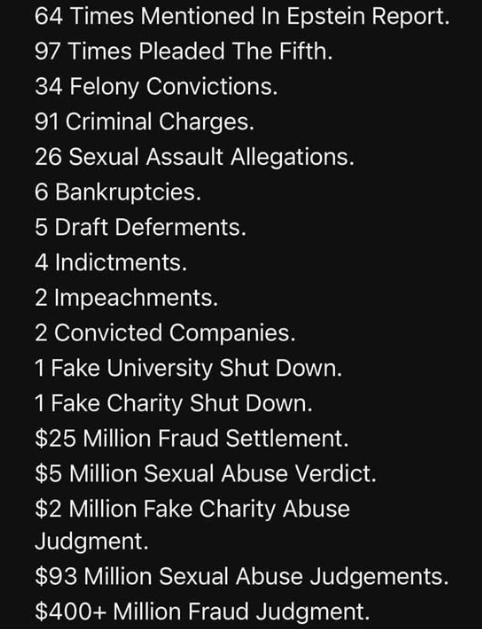Conservatives’ Standards

It truly is remarkable that half of the United States really doesn’t care that they elected one of the worst human beings imaginable.

It truly is remarkable that half of the United States really doesn’t care that they elected one of the worst human beings imaginable.


Speaking of the Lone Star State, a colleague recently pointed out that Russia’s GDP is smaller than that of Texas. We hear so much about the butcher Putin, but so little about his people’s suffering.

It’s because everyone who has even a basic understanding of the world oil market knows that this is pure stupidity, aimed at the most uneducated Americans who constitute the core of Trump’s base.
Of course, that doesn’t mean that idiocy like this can’t “trend.” It’s not as if our country has a lack of ignorance. We did re-elect Trump, didn’t we?
Someone asked me recently to explain why Big Oil isn’t thrilled that Trump has opened up our pristine wildernesses to the extraction of crude. The answer, of course, is that oil executives making 8-figure annual incomes actually do understand how to make money. That’s how they attained their positions, and, sadly, it’s their only purpose in life. They know that spending hundreds of billions of dollars in new infrastructure, while driving up supply and thus lowering prices at the pump, isn’t a strong idea.

Trump and his team commit so many crimes in an average week that Americans, with their fantastically short attention spans, can’t stay focused on any one atrocity.
This, of course, is exacerbated by the for-profit media that needs to ensure a maximum of public outrage at all times, from both the left and the right, and this requires new subject matter on a daily basis.


At this point, it appears that the billionaires can do anything they want, insofar as they own all three branches of the U.S. federal government.

An old friend told me, “The problem is that he always wins.”
My reply: “So far, but keep in mind that everyone is undefeated until their first loss.”

Now is your chance! Join our free investor webinar and learn more about how Phoenix Energy can help you get 9-13% annual interest rates with monthly payments or compounding interest.
I hope somebody will notify me when/if the first investor gets a single penny back.
If you’re a gullible idiot who doesn’t know the first thing about the world oil market, this could be for you. Any political persuasion is fine, but 99% of the target market here are Trump supporters, with that perfect blend of faux patriotism, ignorance, and arrogance.
If you have any capacity to think for yourself, ask yourself why the executive strata at Big Oil has exactly zero interest in pursuing this path. The CEO of ExxonMobil made $44.1 million last year. How did you and your plumbing company do?

Let’s start by admitting that, unless a miracle occurs, it’s extremely unlikely that there will still be organized human life here in 100 years, let alone 2000. Environmental collapse, runaway disease unleashed from the melting of permafrost, nuclear holocaust, AI, and a variety of other as-yet-unseen threats leave us with what most informed people would agree to be a poor chance of survival. But let’s set that aside and assume that humankind just keeps bumping along.
A few ideas:
The iconic religious figures like Jesus Christ, Mohammed, and the Buddha might still be topics for intellectuals of the fifth millennium CE. It’s unlikely that a new religion will take hold, as the world (outside the United States) becomes more dependent on science and less on superstition.
As much as I hate to say it, I doubt that anything that’s happened in music will make it anywhere close to another 2000 years. It pains me to think of a day when the works of people like Bach, Mozart, Beethoven, and Chopin are forgotten, but that seems inevitable.
My last remark may come as a surprise: It’s possible that the name Donald Trump may be on people’s lips into the indefinite future. Two millennia after the fall of Rome, we’re still studying and analyzing what happened to what was at the time, the most empire that Earth had even seen. We write books on the subject that weigh more than a small boy, but there was no single culprit. And we’ve examined it all: Caesar, corruption, Nero, decadence, outreach into lands that are uncontrollable. The debates still continues.
It’s possible that the people studying world economics and politics in the future will wonder what caused the wealthiest and most powerful nation in Earth’s history to wither, grow cold, and die–all within just a few years. It wasn’t Bill and Hillary Clinton.